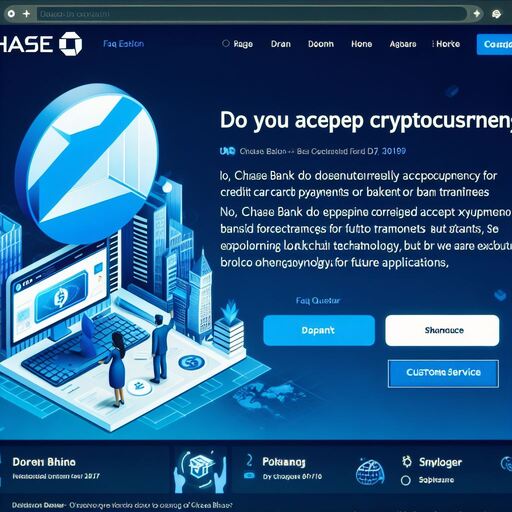Crypto investors and merchants alike often wonder whether America’s largest bank, Chase, allows customers to hold, buy, sell or transact in cryptocurrency assets on its platform. We try to address the question Does Chase Bank Accept Cryptocurrency Yet?
Beyond superficial brand expectations set by Chase’s parent JPMorgan having recently established a blockchain and crypto-centered division for institutional clients, what are Chase Bank’s official policies currently allowing retail banking customers to engage with Bitcoin, Ethereum or other decentralized digital currencies?
This complete guide analyzes current stances prohibiting crypto still today across Chase consumer accounts, hypothesizing potential avenues of incremental “warming up” acceptance in coming years as competitive options increasingly leverage blockchain payment rails irresistible overarching global adoption metabolizing all networks eventually conforming to cryptocurrency standards thanks to reliability, security and censorship resistance guarantees programmatic decentralization provides all entities universally.
By end of reading, a comprehensive perspective should emerge realizing Chase’s seemingly rigid anti-crypto policy today faces overwhelming grassroots and institutional adoption pressures inevitably forcing gradual integration support options in some capacity for cryptocurrency – if seeking maintaining account holder stickiness and activity relevance as asset flows migrate decentral simultaneously.
Let’s dive in assessing Chase’s past and present crypto rules, potential future outlook, voice channels that can influence updated perspectives internally driving change, and concluding thoughts on inevitable client demand outcry forcing adaptation… sooner or later.
Does Chase Accept Cryptocurrency Transactions or Purchases Currently?
Bluntly put – NO – Chase Bank maintains a publicly declared policy prohibiting retail banking customers buying, selling or transacting in top cryptocurrencies like Bitcoin and Ethereum across personal credit cards, debit cards, wire transfers or any other Chase-intermediated mainstream banking product.
This prohibition began February 2018 citing “volatile, unregulated markets” and has sustained despite growing public adoption and legitimacy of blockchain assets maturing significantly over 5 years since, to the frustration of many Chase customers and crypto investors alike.
Repeated customer inquiries asking “Does Chase allow crypto buys?” are met with firm denial statements:
“We regularly evaluate our policy as the cryptocurrency market evolves, we currently have no plans to offer cryptocurrencies.”
The routine script pays lip service suggesting ongoing evaluation, but ultimately cites no specific plans for integration or changes, vaguely kicking the can down the road indefinitely.
Therefore in plain terms – No – Chase Bank today does not support retail customers using Chase banking products or accounts to purchase, sell, send, receive or hold popular cryptocurrencies like Bitcoin at the start of 2023.
Chase strategically avoids crypto still despite growing industry adoption trends from competitors increasingly supportive onboarding blockchain payments.
But could that hardline stance soften given overwhelming grassroots interest and swelling competitive industry precedents embracing crypto assets more wholly in coming years?
Let’s hypothesize realistic scenarios that could enable eventual, if reluctant, Chase crypto adoption through incremental customer accommodation even amidst stubborn anti-blockchain digestive banking culture historically at Chase since Bitcoin’s earliest days…
How Could Chase Bank Eventually Begin Facilitating Cryptocurrency?
Despite firm policy prohibitions today in 2023 stemming from crypto’s early “outsider” reputation challenging traditional banking models initially, the unstoppable trend of growing blockchain adoption globally appears poised to pressure Chase retail banking divisions overcoming innate cultural aversion more widely facilitating cryptocurrency transactions customers increasingly demand access towards.
Though the breaking point timing remains fluid, we can reasonably speculate transitional phases that could manifest gradually introducing Chase clients to simple crypto access despite underlying strict limitations remaining in earlier integration stages:
1) Allow Cryptocurrency Purchases via Credit Card
The most basic initial integration could allow cryptocurrency purchases via Chase credit cards while continuing to prohibit payments, transfers or acceptance use cases – similar to rival Bank of America’s recently updated conditional allowance model this past October 2022.
Though still blocking broader utility, this first step permits growing client cryptocurrencies exposure/speculation at more favorable terms than alternative options while limiting business model threats around deposit outflows. Critically, crypto would remain siloed from core bank liabilities.
2) Enable Withdrawals to External Crypto Platforms
The next progressive concession could enable linking Chase Bank accounts to approved cryptocurrency exchanges, allowing smoother withdrawals routing customer funds into crypto trading accounts externally at the holder’s sole discretion – even if Chase itself refuses handling crypto transactions directly.
This allowance recognizes demand inevitably necessitating reliable bridges between traditional banking and crypto worlds, peripherally supporting assets blockchain adoption without adaptation threats.
3) Launch Cryptocurrency Custody Support
Later term developments as crypto merits overwhelms hesitancies might see full-fledged cryptocurrency custody launch through BitGo-like partnerships enabling direct and managed Bitcoin/Ethereum support integrated across Chase Bank accounts.
Although functionally distinct from core consumer products, launching custody arms follows the likes of BNY Mellon, State Street and other Wall St incumbents finally admitting blockchain asset relevance by providing specialized storage, transaction, and trading utilities benefiting clients.
Chase joining crypto custody via affiliates acknowledges disruptive inevitability through customer-facing adjacent platforms related to – but crucially buffered from – core legacy offerings resistant to rapid change.
Can Chase Customers Influence Crypto Perspectives Internally?
Amidst Chase’s hardline cryptocurrency prohibition standing firm today, what realistic options exist for customers seeking updated crypto policies more aligned with blockchain disruption pathways increasingly embraced even across historically stonewalled financial incumbents like Bank of America?
Multiple avenues provide constructive outlets urging internal evolution:
Write CEO Jamie Dimon Directly
As highest authority directing strategy, directly emailing Jamie Dimon respectfully urging considerations around prudent crypto integration merits in balance with risks allows transmitting grassroots client signals straight to the top.
Tweet Publicly Using PR Pressure
Customers publicly tweeting constructive feedback to @Chase and @JamieDimon applying some PR pressure around desired crypto capabilities informs adoption levels masked internally that demands inevitable answers.
Call Support Lines With Feedback
Even Chase customer service reps tally client inquiries eventually influencing product roadmaps and planning. Calling 1-800-935-9935 shares direct voice ammunition up chain of command.
While Chase holds cards presently limiting complaints viability directly forcing policy shifts immediately, reasoned customer advocacy through public and private channels makes impressions – and over years shapes environments incentivizing incremental openness, however reluctantly on surfaces.
The Inevitable Cryptocurrency Future For All Financial Rails
Despite Chase Bank’s hesitant crypto adoption stance presently banning facilitation across accounts, the overwhelming grassroots and institutional cryptocurrency momentum globally seems destined to overwhelm eventually all legacy financial networks kicking and screaming into acquiescence or abjection.
The exponentially growing efficiency, transparency, settlement finality, global inclusion and embedded rule of law guarantees programmable cryptocurrencies provide & permissionless public blockchain architectures deliver now 12+ years into Bitcoin’s production resiliency seems destined to metabolize all existing monetary exchange channels into crypto-native versions systematically thanks to reliability characteristics no traditional financial network achieves alone.
Like previous disruptive computing paradigms slingshotting human productivity exponentially thanks to exponentially deflationary hardware/software advancements, so too does cryptocurrency & its underlying immutable, transparent, decentralized technological architecture enable order of magnitude financial advancements inevitable reluctant laggard adopters attempt resisting – before capitulating integration just as personal computers and internet eventually revolutionized all sectors against stubborn initial reluctance by entities already dominant before disruption.
Chase Bank remains among the last major US financial institutions continuing cryptocurrency prohibition policies amidst global disruption trends embracing adoption. And while such polices may sustain years more, ultimately grassroots & institutional demand influx will transition Chase consumer banking towards crypto-integration in later innings – if maintaining relevance and retaining customer assets into web3 financialization remains priority as new rails open access beyond incumbent controls.
First with reluctance, ultimately with embrace – cryptocurrencies arrive for all whether wanted or not thanks to unrelenting protocols securely upgrading society’s technological standardization global across electronically interconnected human coordination. To the moon!
Conclusion – Overwhelming Demand Overcomes Conservative Reluctance
In conclusion – Chase Bank maintains anti-cryptocurrency policies today formally prohibiting retail banking customers acquiring, trading or transferring popular crypto assets like Bitcoin on any Chase administered banking products as of 2023. Though unconfirmed, concerns around business model disruption likely motivate this conservative prohibition stance rather than solely speculative volatility or compliance risks claimed publically to date.
However the universality of permissionless programmable money and blockchain technological guarantees combined with strengthening grassroots and institutional cryptocurrency adoption globally seem almost certain to pressure Chase’s restrictive policies through overwhelming client demands and competitive necessity in later years following other reluctant global financial incumbent capitulations.
Integrations will likely emerge incrementally and reluctantly – allowing purchases but restricting transfers initially before loosening controls with custodial support offerings once crypto merits overwhelms hesitancies among even historically stonewalled banking conservatisms.
Customers should responsibly voice desired updated capabilities through constructive public feedback and internal advocacy channels pushing increasingly untenable prohibitions towards essential innovation consumers require financial services adjust implementing.
Though the timeframe remains fluid, cryptocurrency provably revolutionizes financial exchange efficiency at global scale thanks to unstoppable Open Source programmability – inevitable metabolizing all existing rails, despite all initial reluctance by legacy intermediaries like Chase Bank. The scales tip exponentially, not linearly, towards crypto adoption formally integrating across Chase consumer banking inevitably soon.








